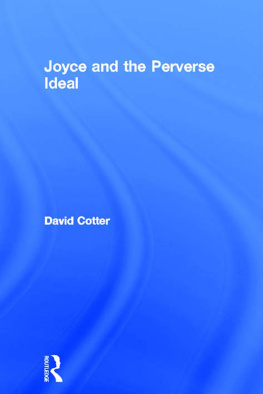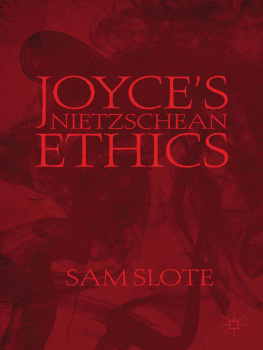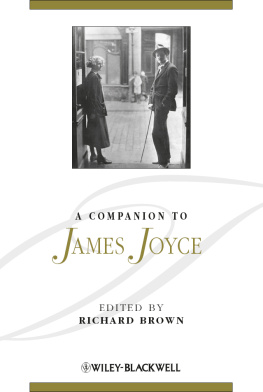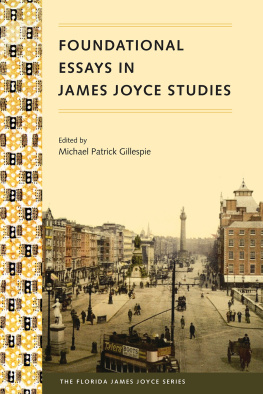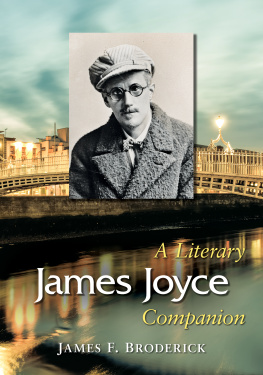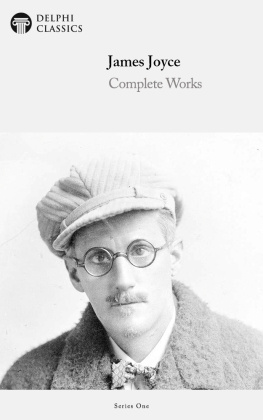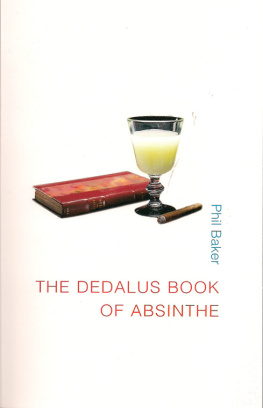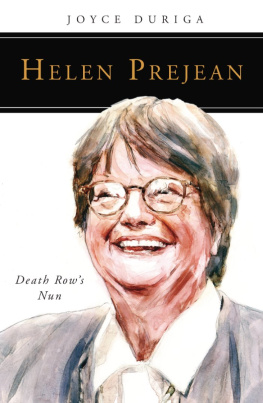J AMES J OYCE
& THE P ERVERSE I DEAL
M AJOR L ITERARY A UTHORS
V OLUME 29
S TUDIES IN
M AJOR L ITERARY A UTHORS
O UTSTANDING D ISSERTATIONS
edited by
William E. Cain
Wellesley College
A R OUTLEDGE S ERIES
O THER B OOKS IN T HIS S ERIES :
A LL T HE W ORLD'S A S TAGE
Dramatic Sensibility in Mary Shelly's Novels
Charlene E. Bunnell
T HOUGHTS P AINFULLY I NTENSE
Hawthorne and the Invalid Author
James N. Mancall
S EX T HEORIES AND THE S HAPING OF T WO M ODERNS
Hemingway and H.D.
Deirdre Anne (McVicker) Pettipiece
W ORD S IGHTINGS
Visual Apparatus and Verbal Reality in Stevens, Bishop and O'Hara
Sarah Riggs
D ELICATE P URSUIT
Discretion in Henry James and Edith Wharton
Jessica Levine
G ERTRUDE S TEIN AND W ALLACE S TEVENS
The Performance of Modern Consciousness
Sara J. Ford
L OST C ITY
Fitzgerald's New York
Lauraleigh O'Meara
S OCIAL D REAMING
Dickens and the Fairy Tale
Elaine Ostry
P ATRIARCHY AND I TS D ISCONTENTS
Sexual Politics in Selected Novels and Stories of Thomas Hardy
Joanna Devereux
A N EW M ATRIX FOR M ODERNISM
A Study of the Fives and Poetry of Charlotte Mew and Anna Wickham
Nelljean McConeghey Rice
W HO R EADS U LYSSES ?
The Rhetoric of the Joyce Wars and the Common Reader
Julie Sloan Brannon
N AKED L IBERTY AND THE W ORLD OF D ESIRE
Elements of Anarchism in the Work of
D. H. Lawrence
Simon Casey
T HE M ACHINE T HAT S INGS
Modernism, Hart Crane, and the Culture of the Body
Gordon Tapper
T. S. E LIOT'S C IVILIZED S AVAGE
Religious Eroticism and Poetics
Laurie J. MacDiarmid
T HE C ARVER C HRONOTOPE
Inside the Life-World of Raymond Carver's Fiction
G. P. Lainsbury
T HIS C OMPOSITE V OICE
The Role of W. B. Yeats in James
Merrill's Poetry
Mark Bauer
P ROGRESS AND I DENTITY IN THE P LAYS OF W. B. Y EATS
Barbara A. Seuss
C ONRAD'S N ARRATIVES OF D IFFERENCES N OT E XACTLY T ALES FOR B OYS
Elizabeth Schneider
G ERARD M ANLEY H OPKINS AND V ICTORIAN C ATHOLICISM
Jill Muller
T HE A RTISTRY AND T RADITION OF T ENNYSON'S B ATTLE P OETRY
J. Timothy Lovelace
J AMES J OYCE
& THE P ERVERSE I DEAL
David Cotter
R OUTLEDGE
New York and London
Published in 2003 by
Routledge
29 West 35th Street
New York, NY 10001
www.routledge-ny.com
Published in Great Britain by
Routledge
11 New Fetter Lane
London EC4P 4EE
www.routledge.co.uk
Copyright 2003 by Taylor & Francis Books, Inc.
Routledge is an imprint of the Taylor & Francis Group.
Printed in the United States of America on acid-free paper.
All rights reserved. No part of this book may be reprinted or reproduced or utilized in any form or by any electronic, mechanical, or other means, now known or hereafter invented, including photocopying and recording, or in any information storage or retrieval system, without written permission from the publishers.
10 9 8 7 6 5 4 3 2
Library of Congress Cataloging-in-Publication Data
Cotter, David, 1964
James Joyce & the perverse ideal / by David Cotter.
p. cm. (Studies in major literary authors ; v. 29) Includes bibliographical references and index.
ISBN 0-415-96786-4 (alk. paper)
1. Joyce, James, 18821941KnowledgePsychology. 2. Psychological fiction, EnglishHistory and criticism. 3. Masochism in literature. I. Title: James Joyce and the perverse ideal. II. Title. III. Series.
PR6019.O9Z52746 2003
823.912dc21
200303928
Contents
Abbreviations
| C.W. | The Critical Writings of James Joyce. Ed. Ellsworth Mason and Richard Ellmann. London: Faber and Faber, 1959. |
| Dub. | Dubliners. Crib Street, Ware, Hertfordshire: Wordsworth Editions Limited, Cumberland House. This edition first published 1993, reprint 1995. |
| P.+E. | Poems and Exiles. Edited with an introduction and notes by J. C. C. Mays. London: Penguin Books, 1992. |
| S.H. | Stephen Hero: Part of the First Draft of A Portrait of the Artist as a Young Man. Edited with an introduction by Theodore Spencer, foreword by John J. Slocum and Herbert Cahoon. Hammersmith, London: First published in Britain by Jonathan Cape, 1991, Paladin, 1994. |
| Port. | A Portrait of the Artist as a Young Man: Complete Authoritative Text with Biographical and Historical Contexts, Critical History, and Essays from Five Contemporary Critical Perspectives. Ed. R. B. Kershner, Boston: Bedford Books of St. Martin's Press. 1993. |
| G.J. | Giacomo Joyce. With notes by Richard Ellmann. London: Faber, 1968. |
| U. | Ulysses: Annotated Student's Edition. Introduction and notes by Declan Kiberd. London: Penguin Books. 1992. |
| F.W. | Finnegans Wake. With an introduction by Seamus Deane. London: Penguin Books, 1992. |
| Ltrs.I / II / III | Letters of James Joyce. Vol. 1., ed. Stuart Gilbert, Vol. 2 and 3, ed. Richard Ellmann. London: Faber, 19571966. |
| S.Ltrs. | Selected Letters of James Joyce. Ed. Richard Ellmann. London: Faber, 1975. |
| J.J. | Richard Ellmann. James Joyce. New and revised edition. Oxford: Oxford University Press, 1982. |
Acknowledgments
Thank you to Declan Kiberd, Richard Stack, and Desmond Fitzgibbon for supporting my ideas, and helping me to develop them.
Thank you to my friendsDan Burgess, Greg Lainsbury, Warnock Chambers and Grace Pan Zhi Weifor standing with me.
Thank you to my familymy father, my brother and my wife, Chen Xifor their patience with me, and for giving me comfort and love unconditionally.
Introduction
The elements of sexual masochism in Joyce are typically either ignored or disdained: they make us feel uncomfortable. Although sexuality is recognized to be at the center of Joyce's work, criticism has addressed this topic from a safe distance, and often with overtones of voyeurism or condescension. When criticism has addressed the topic of sexuality in Joyce, it has tended to focus on the ideological significance of his sexual attitudes, rather than on the nature of the sexuality that he has presented. Although recent criticism has inched closer to this topic, there is nonetheless an abiding reluctance to concede that sexual masochism runs like a core through the center of Joyce, and is the impetus of his writing.
The unwillingness to address this sexual perversity is strange, given that Ulysses is the story of a mild man who for ten years has chosen to masturbate rather than have penetrative sex with his wife, whom he finds very sexy. On the day of Ulysses, Bloom knows that an aggressive man will have sex with Molly, because he has covertly encouraged this event. He is conscious of the time at which Blazes Boylan will arrive at their door, and he considers the moment of their sexual union. Although this causes him much pain, throughout the day he is aroused by masochistic fantasies, which scrutinize this event.
At the climax of the book, in Circe, we are given an only slightly disguised representation of Bloom's masturbatory masochistic fantasy, which the narration dissolves into the pain, sympathy and guilt that Stephen feels before the image of his dead mother. It is in Circe that Bloom's masochism is most apparent. Here, in the dream-text, Bello transforms Bloom into a transvestite maid:

